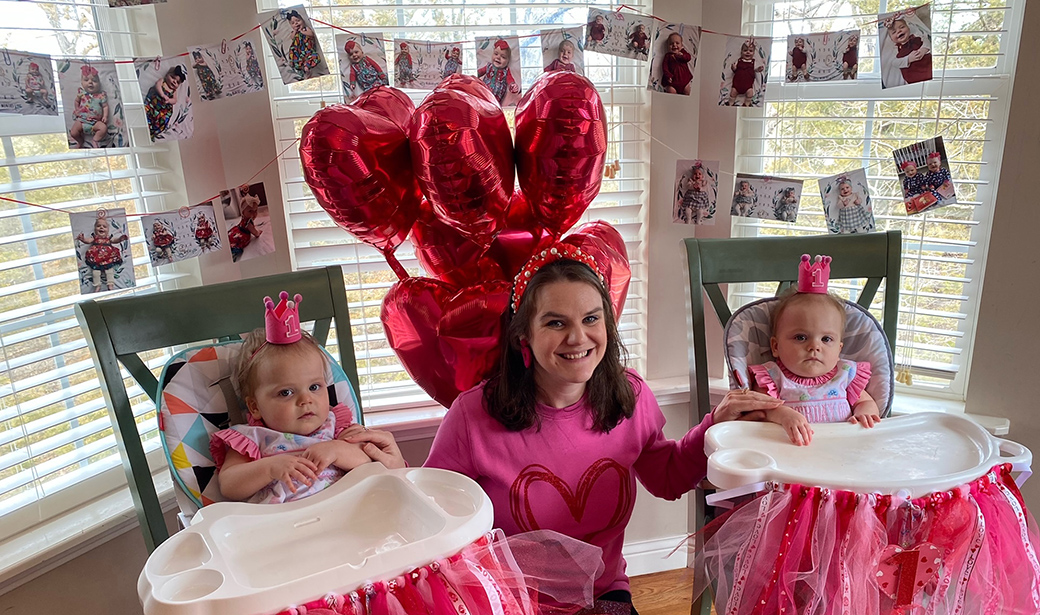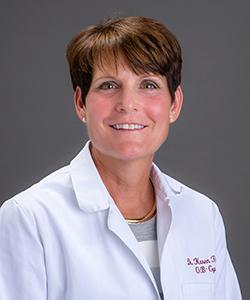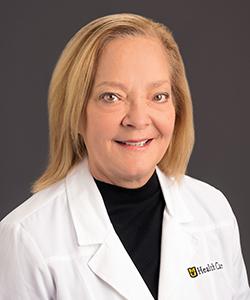Gwendolyn and Vivian Zeller’s first birthday party on February 10, 2024, was a red and pink affair, a celebration influenced by Valentine’s Day. The sisters wore matching "birthday girl” rompers, hair bows and birthday crowns and ate pink and red heart-shaped cakes in the way one-year-olds do.
Their birthday bash was also a week early, which was fitting for the young Boonville residents. More than anything, it was a celebration of overcoming difficult odds for them and mom, Allison Zeller.
“It was Valentines hearts themed as a celebration of our little loves turning one,” Allison said.
Although the Zellers thought their family of four would grow by one, Allison and her husband C.J. received a surprise at her 10-week prenatal appointment from her obstetrician at MU Health Care, Karen Thies, DO.
“I was shocked when Dr. Thies found the second heartbeat,” Allison said. “And then to hear we’re not having just any twins, they’re mono mono twins, was overwhelming.”
Unlike most twins, who grow inside their own amniotic sac with their own placenta, these sisters developed from a split embryo and shared the same amniotic sac and placenta. This prenatal condition — called monoamniotic-monochorionic twins and shortened to mono mono twins — is the rarest form of twin pregnancy, appearing in 1 out of every 8,000 pregnancies in the U.S.
“It was a definite double surprise,” Thies said. “But Allison was in the right place at MU Health Care, because many places don’t have maternal fetal medicine doctors. We have three, in addition to our excellent NICU team. For families who have a complicated pregnancy or a high-risk pregnancy, this is the place to be.”
Because of her twins’ unique and rare condition, Allison was referred to MU Health Care’s Maternal Fetal Care Center. The Zellers met with maternal fetal medicine expert Jean Goodman, MD and neonatologists to talk about the twins’ needs.
And though stress levels were high for Allison and CJ, because Thies previously delivered their two sons, Mack and Leo, that existing relationship helped ease some of her fears as they laid out each step of what to expect during her pregnancy.
“My doctors at MU Health Care were confident, they had a plan, and I never felt worried about the care of myself or my babies,” Allison said. “They made me feel really confident.”
Mothers of mono mono twins face an increased risk of gestational diabetes, preeclampsia, preterm labor and other conditions, making the role of maternal fetal medicine critical. Babies like Gwen and Vivian are at an increased risk of complications and mortality before birth, most commonly because of cord entanglement.
“We knew their cords were going to be entangled, that just happens naturally from the movement that they engage in in utero,” Goodman said. “This can result in what we call a stillbirth. These pregnancies are at risk for that anytime during the pregnancy, and the farther we get in the pregnancy, the more risk there is.”
That risk means mono mono twins are delivered before 34 weeks. Allison’s doctors recommended she be admitted to Women’s Hospital at 26 weeks for advanced monitoring and ultrasounds.
Things were completely different with Mack and Leo, both of whom went past 40 weeks and were born somewhere in the 90th percentile of height and weight.
“From the moment I found out it was twins until I was admitted to the hospital, it was really hard, because my first two pregnancies had been uneventful and easy,” Allison said. “Knowing I was having twins, that they would be premature, that I was going to have a C-section, it was all out of my control. Even though it was hard to leave my family, it was a relief to be in the hospital because I knew if anything went wrong the girls would be OK.”
As Allison got closer to her due date, finding ways to reduce stress was at the front of mind for everyone on her care team. The nurses and sonographers adapted her care so that Allison could work remotely and did everything they could to make her extended stay as comfortable as possible.
The Zellers were able to spend Christmas and New Year’s together outside of the hospital, and Allison moved in in early January of 2023.
“Once she was admitted, her ultrasounds were daily or every other day, and I adjusted the frequency based on how far along Allison was,” Goodman said. “We really took her mental health into account and tried to minimize the stress for her being in the hospital. Despite spending a lot of time away from her family at home she came and adapted remarkably well.”
Goodman, in addition to providing the steadying presence of a doctor who had been through this before, also made sure Allison stayed fed and brought her enough candy and cake each week to celebrate weekly milestones and share with her sons and husband when they visited for dinner.
The level of care and attention Allison received during her pregnancy was clearest when it was time for Vivian and Gwen to be born.
“During my C-section, Dr. Thies, Dr. Goodman and the two residents that had followed me while I was inpatient scrubbed in, which was cool because everybody kind of came together and I could just tell they cared about my babies,” Allison said. “I felt like more than just your typical patient, more of a connection with everyone in the hospital.”
Gwen and Vivian were delivered at 33 weeks and moved into the NICU to stabilize their oxygen needs. Allison visited her daughters every day during their two-month stay, and though that was also difficult, it gave her time to heal from her C-section and allowed the Zellers to prepare the twins’ room before they came home.
“Being a twin mom is the club you never knew you wanted to be a part of, and I’m so grateful to be a twin mom,” Allison said. “I feel so blessed to have two boys and two girls. I really do feel like the luckiest woman in the world.”





